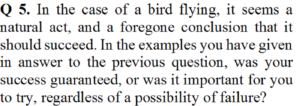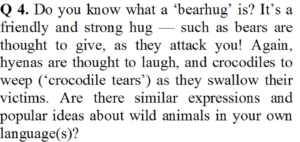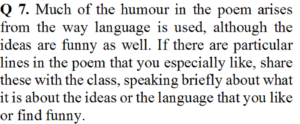English CBSE Class 10 NCERT First Flight Chapter 3 Two Stories about Flying Free Solution of Textbook Questions and Answers
TWO STORIES ABOUT FLYING
(Textbook Questions)
I
HIS FIRST FLIGHT
Thinking about the Text


Answer: The young seagull was afraid because he did not have experience of flying. It was his first flight. He was not sure if his wings would support him. He was afraid of falling down.
All young birds are afraid to make their first flight. Some birds may be less timid. Thus they quickly learn to fly. Parent birds always support their kids in learning how to fly.
A human baby though very innocent, is afraid of taking her first steps. She watches everybody in her house. His parents also support her. They teach her to walk by holding her hands. Gradually baby starts walking. But she falls many times before becoming confident of herself.


Answer: The seagull was very hungry. When he saw food, his hunger increased. He became desperate to eat it.
His mother came near the ledge then stopped close to it. The baby seagull was so hungry that he dived at the food. And he was in the air. Now he had to fly to save his life and he did fly.
His hunger overpowered his fear and he dived at the food. He could not understand that after jumping at the food he would be in the air.


Answer: The baby seagull was afraid of flying. His parents had tried to motivate him but he did not make any attempt to fly.
His parent knew that the baby seagull would not grow and live on his own unless he learnt flying. So they were making efforts to make the baby seagull fly.


Answer: Following is representative answer. Student can write different experience / incident.
I was in class seven when my father got transferred to another town. In our street there was a black dog. It looked so fierce. It used to bark at every passersby. I did not dare to walk alone in the street.
My father gave me a stick and asked me to hit the dog if it came near me. Somehow I walked through the street. When the dog came near me, I waved the stick towards it. It did not come near me but kept barking. Somehow I reached my friends’ house. This became my routine.
Once while crossing the street I observed that the dog was sleeping. It was a relief for me. Suddenly I saw a parrot in the street. I kept on walking while looking at the parrot. I was so intently watching it that I missed my steps and I fell on that black dog. The dog got scared and ran away. I was surprised.
After that incident, the dog never barked at me but always ran away from me. Now the dog was afraid of me.
My parents were happy that I had overcome my fear.


Answer: In the attempt that I had made, there were chances of failure. If the dog did not stop coming near to me, after looking at the stick the whole exercise would have been a failure. I was not sure if this trick would succeed. My parents supported me. In fact the first day my father was walking a little behind me to support me. I surely wanted to go to my friends’ house to play.
Thus it was important for me to make an attempt. Finally I had succeeded.
****
II
A BLACK AEROPLANE
Thinking about the Text


Answer: The risk was of flying through the clouds of storm. It is difficult to fly in the storm. Sometimes planes get crashed.
The pilot wanted to reach home as soon as possible. Hence he took the risk.


Answer: When pilot entered the storm his plane started jumping and twisting. He could not see anything. His compass and radio stopped working. Suddenly he saw an aeroplane in front of him. The other pilot waved at him to follow his plane. That plane guided him through the storm. Finally he safely landed at an airport.


Answer: He was relieved that he had come out of the storm without any damage to himself or his plane. He had also made a safe landing before his fuel was completely exhausted.
He was happy on these accounts and hence made this statement.


Answer: The narrator requested the woman at the control room to tell him about the other aeroplane and its pilot. The narrator wanted to thank the other pilot.
The woman looked at the narrator strangely because no other plane was flying during that time.


Answer: The woman had confirmed that no other plane was in the sky. Narrator was determined to get out of the storm. The narrator was able to come out of the storm because of his strong will power and his skill of flying.
It was simply his imagination that he saw another plane.
Thinking about language




The word ‘black’ in this sentence means black colour


The word ‘black’ in this sentence mean an angry look.


The word ‘blackest’ in this sentence mean the most cruel and shameful act.


The phrase ‘black comedy’ means presentation of a serious matter in humourous and light manner.


In this sentence the word ‘black’ means to sell illegally at high price.


In this sentence the phrase ‘beaten black and blue’ means that the criminal was severely beaten and he suffered injuries all over his body.


| A | B(answer) |
| Fly a flag | Display a flag on long pole |
| Fly into rage | Become suddenly very angry |
| Fly along | Move quickly / suddenly |
| Fly high | Be successful |
| Fly the coop | Escape from a place |


| Word | Answer |
| Swoop | Yes |
| Flit | Yes |
| Paddle | |
| Flutter | Yes |
| Ascend | Yes |
| Float | Yes |
| Ride | |
| Skim | yes |
| Sink | |
| Dart | Yes |
| Hover | Yes |
| Glide | Yes |
| Descend | Yes |
| Soar | Yes |
| Shoot | |
| Spring | |
| Stay | |
| Fall | |
| Sail | Yes |
| Flap | Yes |
****
HOW TO TELL ANIMALS
(Text book questions)
Thinking about the Poem


Answer: The word ‘dying’ does not rhyme with ‘lion’. Closest to the meaning and rhyme is ‘dyin’. Hence it has been used.


Answer: The lion is a large and tawny animal which may advance towards us. We can identify it by its roar that can frighten us to death.
The tiger is a yellow beast with black stripes on it. It will eat us as soon as it sees us.


Answer: No, these words have not been spelt correctly. Poet has used these spellings to rhyme with other word of poem. When spelt is used in this way, these words rhyme with ‘leapoard’.


Students should answer this question on their own.


Answer: The correct line could be ‘A novice may become nonplussed’.
But this line does create a good rhyme. The poet has used this line differently in the poem to match the rhyme of the stanza.


Answer: Some liberty in the poem with respect to language and grammar is taken in many poems. Some of the examples could be
1. Therefore, on every morrow, are we wreathing
A flowery band to bind us to the earth,
Spite of despondence, of the inhuman dearth
2. And wrinkled lip, and sneer of cold command,
Tell that its sculptor well those passions read
Which yet survive, stamped on these lifeless things,
The hand that mocked them, and the heart that fed;
These examples are of English language. Students can pick up examples in their language on their own.


Students should answer this question themselves. Some of the examples could be
1. If he roars at you as you’re dyin’
You’ll know it is the Asian Lion…
If you are dying, what is the use of identify an animal.
2. Just notice if he eats you.
This simple rule may help you learn
The Bengal Tiger to discern.
If it has already eaten you, how you can identify it.
3. The Crocodile you always may
Tell from the Hyena thus:
Hyenas come with merry smiles;
But if they weep they’re Crocodiles.
A crocodile weeps while eating is quite funny
****
THE BALL POEM
(Text book questions)
Thinking about the Poem


Answer: The boy is deeply thinking about his loss. The poet does not want to disturb his thoughts.
The poet does not offer any money to him so that the boy learns that in life sometimes one needs to bear a loss.


Answer: Yes, it appears that the ball has been with the boy since his childhood days. His memories of childhood when he used to play with the ball is linked with the ball. All his childhood memories have gone into the water pool with the ball.


Answer: It means that people in the world like to buy many things. The world believes in materialistic aspect of living. But money is only an external aspect because it cannot buy happiness and belongingness.


Answer: No, the boy had not lost anything earlier. ‘He senses first responsibility’ and ‘he is learning’ are two lines which indicate that it was his first loss.


Answer: According to poet, the boy is learning to tolerate a loss.
Many things in this life are lost forever. He is learning that in this materialistic world there are several emotional losses. Such losses can never be made up.


Answer: When I was in class six, my father had gifted me a bicycle on my birthday. I used to go to school on it. This bicycle was very helpful when my parents used to ask me to buy vegetables and grocery. I was learning lessons of life while shopping household items. It was a joy to commute to my school independently. I even used to go to playground near my house on my bicycle.
Two years later, as usual, I had parked my bicycle at the playground. When I returned from the field I did not find my bicycle there. My friends told me that probably it was stolen. I nearly cried but held my emotions. I reached home and started crying. I told my parents that my bicycle was stolen.
We went to police station to lodge a complaint. But the bicycle could not be found.
Even today I feel sad when I recall the loss of my first bicycle.
****


0 Comments